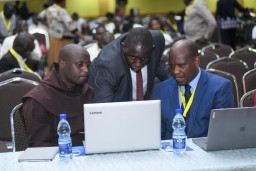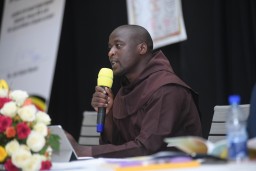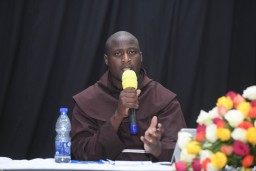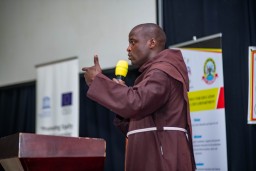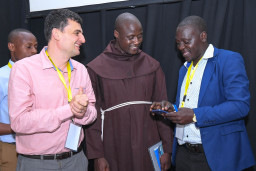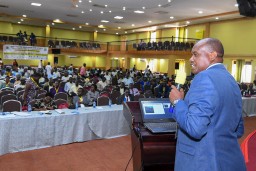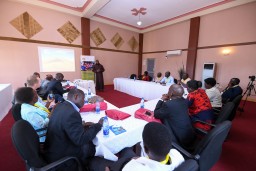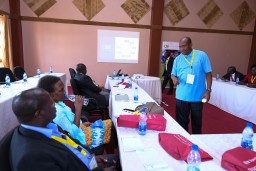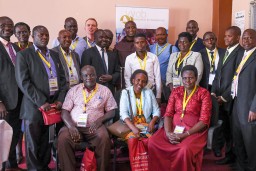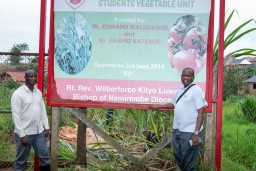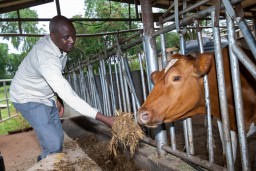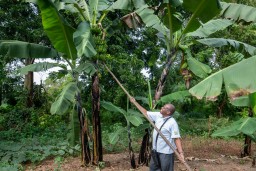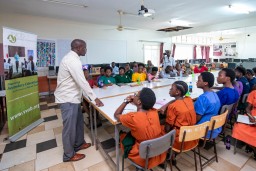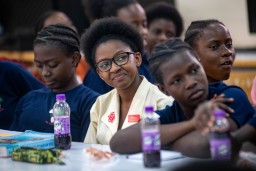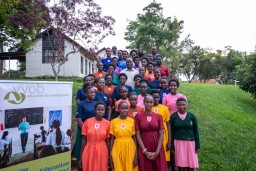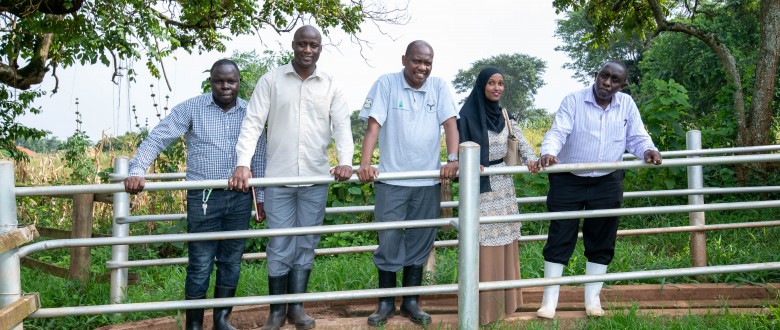
In February, VVOB had the honour of receiving Brother Peter Tabichi, winner of the prestigious $1 million Global Teacher Prize, to Uganda. He was the keynote speaker at the Ministry of Education and Sports’ annual Symposium on teacher education and took some time getting to know VVOB’s plans for quality agricultural education in the country, as well as our partners.
First, find out everything you need to know about ‘From classroom to land: teaching agriculture practically’, VVOB’s programme in Uganda.
Extra-ordinary
Long before the Global Teacher Prize ever came into the picture, Brother Peter Tabichi was not your run-of-the-mill teacher.
Peter works in a very remote, semi-arid part of Kenya where he teaches physics and mathematics to students at Keriko Mixed Day Secondary School. His dedication to teaching and belief in his students’ talents turned his poorly resourced and ill-equipped school into the best public school in Kenya – officially – and one of the best schools in Kenya overall. Girls’ achievement has especially soared. Peter persuades girl students and their parents of the importance of education and science over marriage or starting a family.
“A teacher’s role is to change the lives of their students for years to come”, Peter set the tone of his visit on the first day at VVOB’s office in Uganda’s capital of Kampala. “So much can be achieved if we go above and beyond the traditional boundaries of our subjects.”
Peter (right) and Dr. Maina Gioko (left), finalist of the 2019 Global Teacher Prize, were in Uganda (24-28 February) for the 2020 Symposium on teacher education organised by Uganda’s Ministry of Education and Sports. Peter graciously accepted VVOB’s and the Ministry’s invitation to deliver the keynote on 27 February, while his companion Maina presented the results of a study evaluating the use of ICT as a pedagogical tool in Kenyan schools.

Click through the pictures below to get up to speed on Brother Peter’s key messages.
Harmonising education with the real world
Peter’s hard work has not only changed his learners’ lives, 95% of whom come from poor families, but also his own. Varkey Foundation awarded him the prestigious $1 million Global Teacher Prize, which celebrates “an exceptional teacher who has made an outstanding contribution to their profession”. The video below shows you why exactly he deserves it.
We are incredibly proud of the work that our 2019 Global @TeacherPrize Winner Peter Tabichi does to help his community in Kenya.
Find out more about why he is an inspiration to so many people. pic.twitter.com/Zk2qTetKr1
— Varkey Foundation (@VarkeyFdn) March 24, 2019
But as is the case with everything else he receives, Peter puts this accolade to the benefit of his school: “The Teacher Prize is not about me winning, it is about the effect this has had on my school and community. After we were recognised for our valuable work, private companies such as Safaricom [Kenyan telecom company] and CISCO [IT company] reached out in support”, he shared.
“We need to bring that real world of work into the classroom, and the classroom into the real world. This will give students hope for their future”, said Peter on connecting school with the private sector. He firmly believes in building bridges between the classroom on one side, and with the surrounding businesses and communities of the schools on the other, as well as the homes of the students.
What is more, in recognition of the great potential the agriculture sector has for both work opportunities and food security, he is an outspoken advocate of quality agricultural education. He trains his students – and the school’s community – on how to grow a wide range of crops, and plants trees in fighting climate change.
Those two elements – building bridges and agricultural education – are wrapped up in TAP, VVOB’s programme in Uganda (‘Teaching agriculture practically’). TAP revolves around agricultural education that is of high quality, which, to VVOB, means (1) it is taught in a very practical, competence-based manner; (2) it includes internship opportunities at private companies in students’ communities; and (3) it fosters entrepreneurship skills.
Teaching agriculture practically – to all
VVOB’s key partners in this endeavour are the National Teachers Colleges (NTCs) of Mubende and Unyama and the National Instructors College Abilonino (NICA). These colleges are set on delivering new teachers that teach agriculture to secondary students in a way that upholds the abovementioned 3 key principles of TAP: practice, internship and entrepreneurship.
In the spirit of ‘practice what you preach’, lecturers at the NTCs and NICA who train future teachers stand by those same principles. For example, student agriculture teachers are deeply involved in the maintenance of their institutions’ school farms or build their competences at industrial training sites across the agribusiness ecosystem.
Much to the acclamation of Peter, who took time out of his busy schedule to exchange ideas and experiences with the involved lecturers. Agricultural teachers need to go about their job in a practical manner, he said, if they want to deliver quality work. “Being a good teacher also means you have to engage students to the fullest, give them reasons to do something and do it well. Then, they can apply what they learnt in collaboration with, and to the benefit of, their communities.”
Pictures of Peter and Maina with the lecturers:
Student agriculture teachers at these partner colleges are also required to dedicate a valuable amount of time to teaching at practice schools, under support-supervision by their lecturers. One of the practice schools partaking in TAP is Gayaza High School. The all-girl secondary school lies some 20 kilometres northeast of Kampala, a journey the Kenyan delegation undertook to speak with teachers and students about the importance of agricultural education, and how we can ensure its quality. Peter encouraged the student members of the Gayaza Youth Future Farmers Africa Club to acquire as many agricultural skills as possible while still in school: “This will make you better leaders in the future and enable you to ensure food security and income generation for your communities.”
Peter also addressed his fellow teachers from Gayaza High School directly. He incited them to dedicate as much time as possible to their students, and to take their education much further than what is strictly required of them by the curriculum.
Pictures of Peter and Maina on their visit to Gayaza High School:
Taking teacher motivation to the highest level
TAP is funded by the Belgian Directorate General of Development Cooperation and Humanitarian Aid (DGD), and VVOB took Peter and Maina to the Belgian Embassy in Kampala. There too, the delegation from Kenya and VVOB shared the joint message that quality agricultural education is crucial in the context of Uganda, a message that was corroborated by Ambassador Veestraeten and Head of Cooperation Erwin De Wandel. “Technical and vocational education and training as well as skilling are flagship programmes for Belgium in Uganda”, said the latter, confirming Belgium’s priorities in its cooperation with Uganda.
Peter also met with the education minister, Janet Kataaha Museveni, at the symposium and was a guest of honour at a dinner organised by VVOB together with the Ministry. It was hosted by Dr. Jane Egau Okou, Commissioner of Teacher/Tutor, Instructor Education and Training.
“We extend our gratitude to VVOB for bringing us together”, Dr. Egau spoke to the invitees. “And to Brother Peter, a global teacher, for addressing the symposium and making it a success. I speak for all participants when I say we are impressed and honoured to listen and learn from him. Peter embodies our vision of the 21st century teacher.”
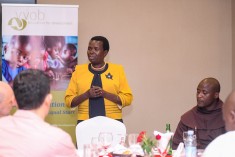
Last week’s visit by the most-awarded teacher of today sent waves of inspiration through all who had the opportunity to hear Peter speak, be it participants at the ministry’s Symposium, NTC and NICA lecturers, Gayaza High School students and teachers, or individuals at the highest political levels.
At VVOB too, we are still processing all his lessons and are encouraged by him to keep going with TAP. It was a pleasure to host Brother Peter and Dr. Maina, two extremely motivated educators whom you can’t help but become more motivated by too.
All pictures: ©Joseph Senyondo





